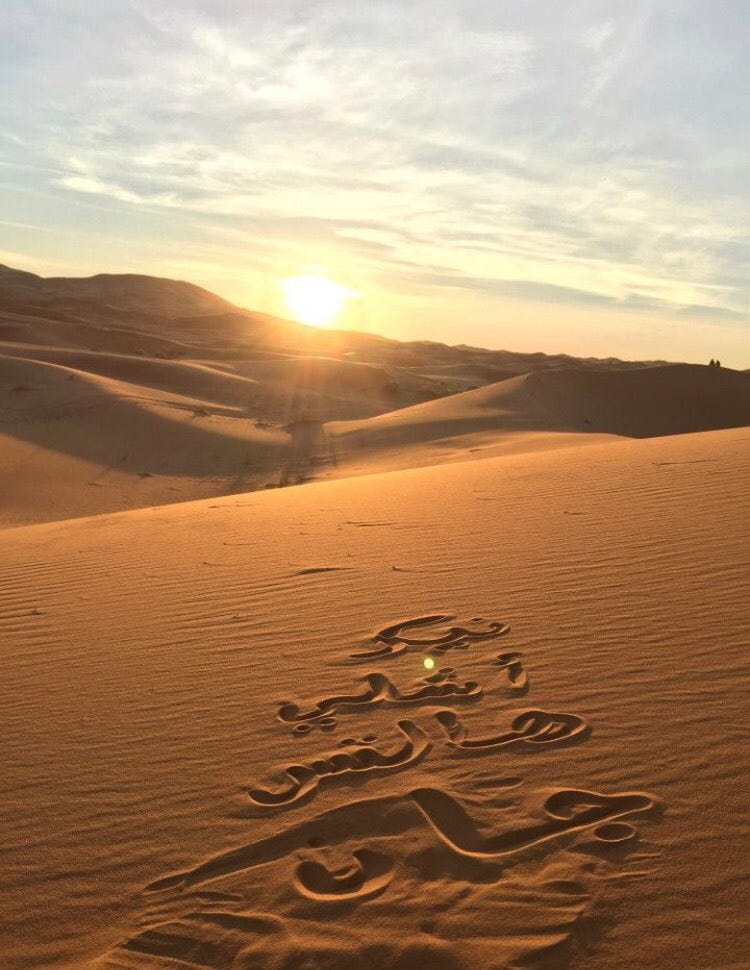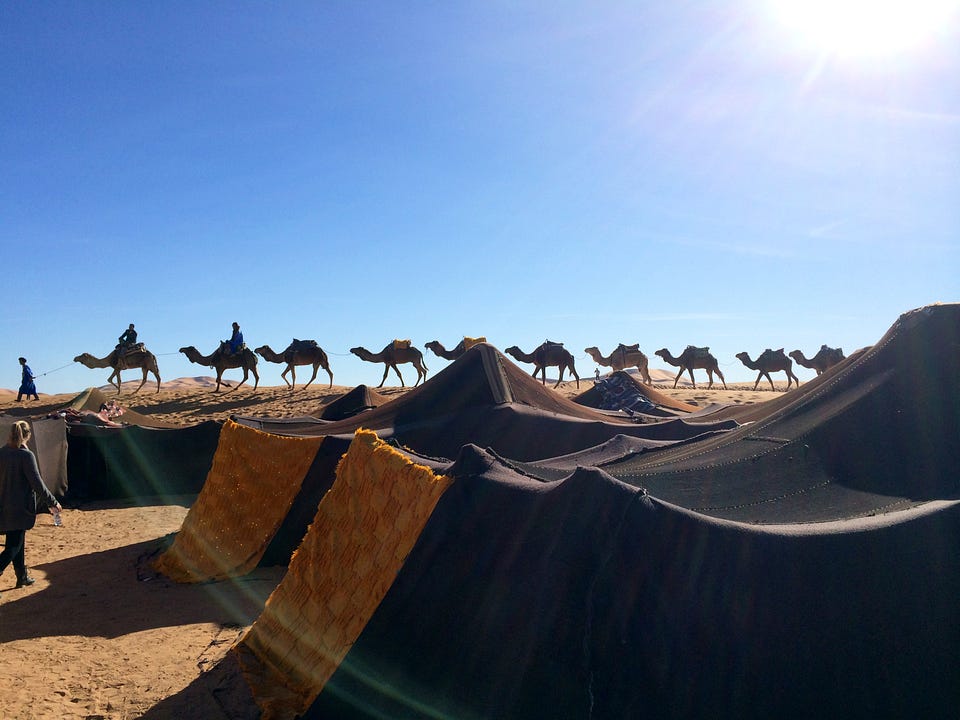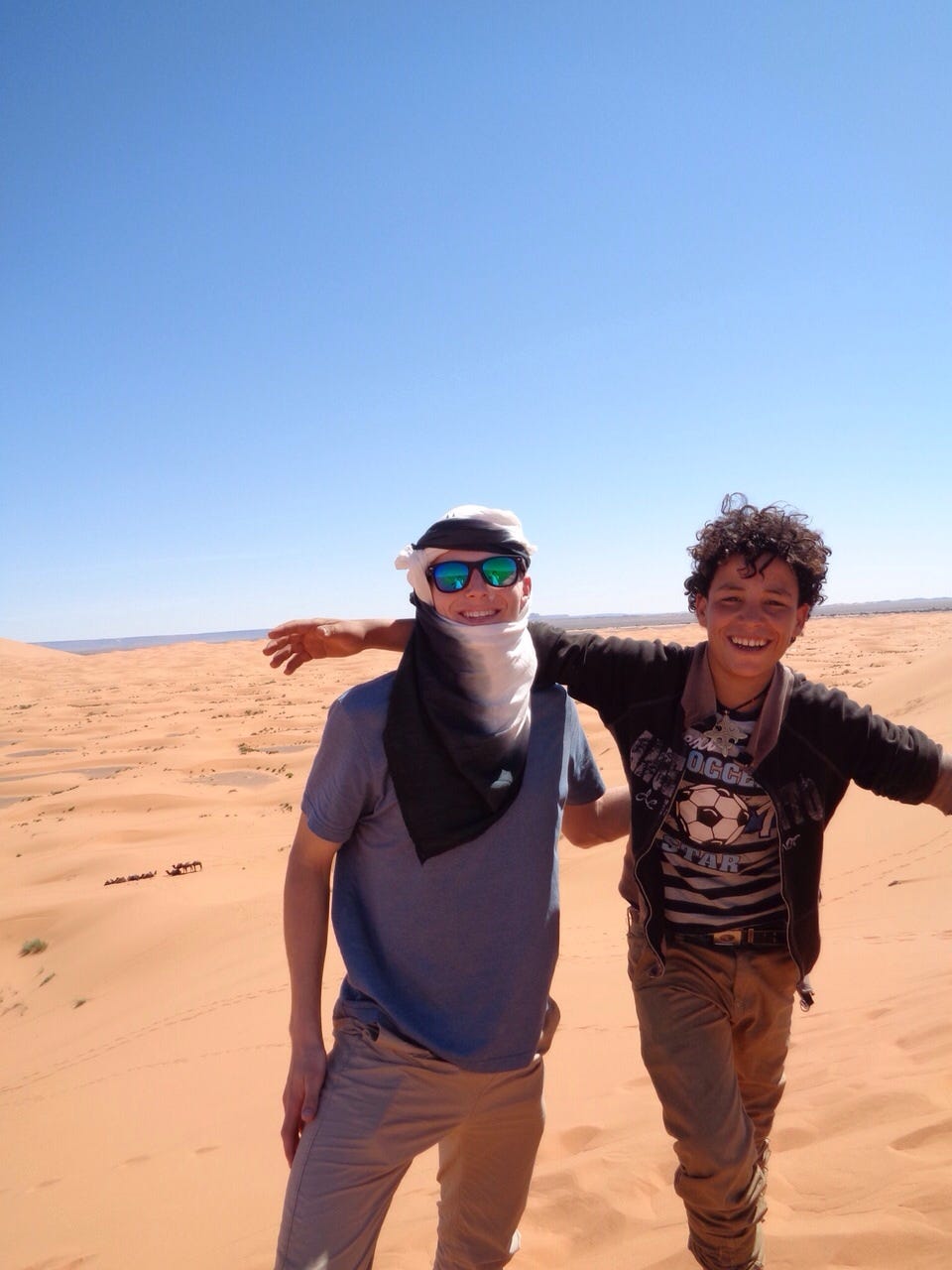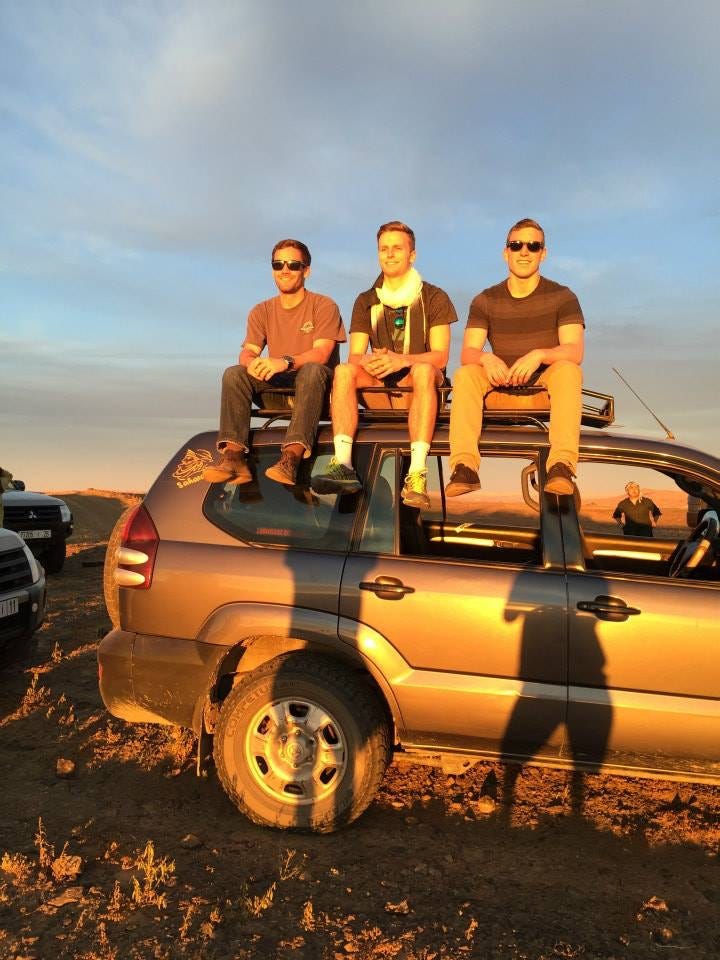Why We Don’t Need Verbal Language
By: Nick Costelloe
Chief Adventure Officer, Universal Dialect

Merzouga, Morocco. The intense afternoon heat from the sun beats down on our thick, dark Berber tent. Inside, a group of locals are playing music in an effort to entertain our student group, who traveled great lengths by plane and bus to reach Merzouga. Through the narrow, triangular opening of the tent, bright light shines through, revealing a glimpse of the endless sand dunes of the Sahara desert.
Our group is visiting this small desert town in Morocco as part of a semester abroad in Europe. While some of our fellow students opted to travel to Italy or the islands of Greece, we decided to head to North Africa to dive into the culture of the local Berber people and explore a country which, from our initial perspective, seemed vastly different than any country in Europe. Besides, the idea of camping under the stars in the desert was enticing.
We are exhausted after activities in the morning that could only be described as some of the most memorable experiences of my life, including a camel ride across the vast sand dunes. As we sit in the tent, my skin still hot from the unavoidable sunburn, the soft rhythm of the drums has me in a sleepy daze. All is calm.

After the much-needed break from the sun’s intense rays, my friends and I venture outside and are greeted by noticeably cooler air, and we can tell that the night we will spend in the desert will be quite cold. As our eyes readjust to the light, a group of local kids begin to gather in a flat, sandy stretch of land adjacent to our camp. The kids are smiling, playfully chatting with each other in their native tongue. They seem to be waiting for something.
We walk over.
My close friend and fellow adventurer, Clayton, attempts to speak to the kids in English, mainly to ask what they are waiting for, but we quickly realize that they do not understand. A moment passes before one of the older kids, who looks like the leader, takes off his worn sandals and jogs over to an end of the opening. He places them down about 2 feet apart from each other. Another boy does the same on the opposite end, and Clayton and I begin to realize what’s happening —
A soccer ball flies into our vision, seemingly appearing out of thin air, and immediately the kids jump into action. They all sprint towards the ball and chase each other down in attempts to hold onto it. It’s a game of keep-away, and everyone wants to have the ball at their feet. The movement, energy, and passion on display is contagious, and Clayton and I (who play varsity soccer together at college) couldn’t help but jump in. After a minute or two of battling over the ball, the leader grabs the ball, picks it up, and yells out, motioning for some organization. Quickly, the local kids form as a group defending one of the shoe goals, and the boy with the ball grabs Clayton’s arm and points over to the rest of our study abroad group, most of whom are eagerly watching from the side of the pitch. We don’t understand the leader’s words, but it doesn’t matter; we know that he wants the rest of our group to join us for a pickup soccer match — locals vs. foreigners.
We round up all of the Americans who are adventurous enough to play. We notice that all of the kids are playing without shoes, which prompts us to take off our Nikes to match. The sand pitch is littered with small rocks and coarse objects, but it’s only fair to play with the same challenges that our opponents are facing — likely out of necessity and not by choice.
In no time, the game begins. Shoeless, on this flat and sandy pitch, we run, we play, we smile, and we adventure together. As the game progresses, some of the Americans on our team begin to tire and the teams begin to mix — locals and foreigners playing together, as one.

While one would think that it would be difficult to communicate with each other, given that we don’t speak the same language, it doesn’t matter. The body language and movement of the game tells the whole story, and we broke through the language barrier. We are all in sync, communicating through the universal dialect of the game, and we play until the sun is beginning to set behind the sand dunes on the horizon. High fives and smiles are enough to supersede the traditional “Good game!”
At night, my friends and I reflect on our incredible day under the most beautiful night sky that we’ve ever seen — the stardust of the Milky Way Galaxy completely illuminated due to the lack of light pollution. I couldn’t help but smile thinking of the incredible adventure of playing with the locals, and how we were able to connect despite the language barrier.
It took me a few more experiences similar to this around the world to realize that, in the context of soccer, verbal language doesn’t matter.
Body language and smiles tell the whole story, and soccer is truly a tool to help bridge the gap between different cultures and ethnicities. The truth is that you can travel anywhere in the world and, if you have a ball, or if you come across a group playing, you’ll be able to communicate and belong. The language barrier becomes obsolete, and you can truly connect with the people you are playing with. Oftentimes, it’s the adventure of a pickup game that is most universal.

At Universal Dialect, we define a soccer adventure as what happens after you give a kid a soccer ball. It’s the movement, the energy, and the passion that takes over. It’s this same adventure that unifies groups of people from all over the world. When we communicate through this non-verbal dialect, we realize that we’re not so different after all. We’re all looking for belonging, and adventure through the Beautiful Game makes it all possible.
Thinking back to the pickup game in Morocco, I’ve had the pleasure of experiencing similar scenarios in China, Peru, Tanzania, Thailand, and Costa Rica. The only necessity to play? A soccer ball. Our goal is to give as many soccer adventures to underprivileged kids as we can, in the form of a ball. Soccer, and the underlying adventure, is the Universal Dialect. Stand with us on our mission.





Leave a comment